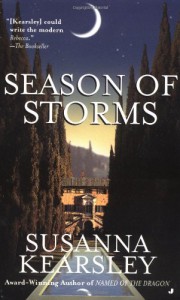
This novel is the story of Celia Sands, a young actress given the lead role in a play written by Italian poet and playright Galeazzo D'Ascanio some seventy years previously. The play - Il Prezzo - was inspired by D'Ascanio's muse and lover, an English actress also named Celia Sands. (The actresses are not related). The first Celia disappeared on the night before the play was due to have its first performance and D'Ascanio's grandson has decided to recreate the play in the outdoor theatre built in the garden of his grandfather's estate on Lake Garda.
I really like some aspects of the novel. Kearsley writes clear, elegant prose. She's good at description and her dialogue reads well. There's a big tick for the scenes set in Venice, one of my favourite cities. There's an equally big tick for locating most of the action in a beautiful villa on Lake Garda. I've not been there, but this novel has placed going there on my to-do list. As a theatre lover, I liked the theatrical references: there's stuff about Shakespeare and about Sophocles, about stagecraft, about blocking and technical rehearsals. I also liked the division of the novel into Acts and scenes rather than chapters. It's a cute device in a novel in which theatre is central. There's also an appealing hero, a couple of very nice dogs and some attractive supporting characters.
However, there's quite a bit on the negative side. Overall, the characterisation is flat. The hero isn't fleshed out nearly enough, the heroine / narrator is a bit young and silly and the villains are in the style of bad melodrama. There are very slight supernatural and mystery elements, which don't really go anywhere. Indeed, the mystery - such as it is - is very pedestrian. In addition, it's one of those novels in which coincidence is piled upon coincidence - to the extent that Kearsley has one of the characters comment on the inherent unlikelihood of part of the narrative. There's also some heavy-handed telegraphing of a not terribly important plot point, which had me repeatedly rolling my eyes.
This is the third novel by Susanna Kearsley which I've read and while I like her work well enough, it seems unlikely that she'll ever blow me away. That said, if I were a novelist, I wouldn't mind being like Susanna Kearsley. She sets her books in beautiful locations and clearly spends time in those locations as part of her research. This presumably gives her a useful tax deduction, even if the novel isn't a bestseller. To me this seems like a very sound business plan for a novelist who likes to travel.
If I didn't love the theatre and Italy, I wouldn't have enjoyed this book all that much. However, the setting, the subject matter and the fact that it's an easy, pleasant read make it worth the three star rating.




